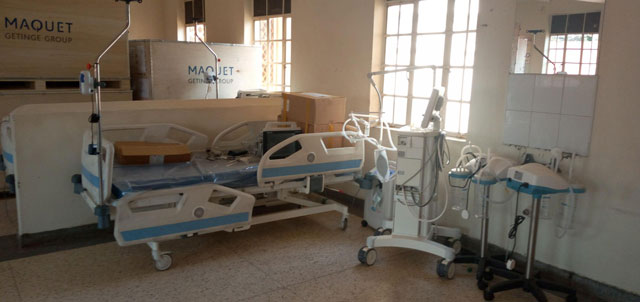
Kampala, Uganda | THE INDEPENDENT | Intensive Care Units in the country are not up and running as intended due to a lack of staff to operationalise the specialised wards.
According to hospital administrators that URN spoke to, most regional referral ICUs in the country are not working due to a lack of vital staff like anesthesiologists and critical care nurses needed for any ICU to function.
In an ICU, anesthesiologists offer medical assessment and diagnosis for patients. They provide airway management, cardiac and pulmonary resuscitation, advanced life support and pain control.
Critical care nurses, on the other hand, run the day to day functioning of the unit. They coordinate care for the patient and often spend the most amount of time with the patient. They are expected to monitor the patient and all the equipment like ventilators that they might be attached to make sure the patients are stable.
Due to a lack of staff like nurses trained in critical care and anesthesiologist, critically ill COVID-19 patients that require vital care are referred to ICUs in Kampala. This has left many ICU’s in the capital, overwhelmed with numbers.
At Gulu Regional Referral hospital, the hospital does not have nurses trained to work in the ICU. Dr Paska Apiyo, the head of the COVID-19 treatment unit at the hospital, says they cannot use the ICU because they do not have trained staff.
“Right now, we do not have beds, but even if we did, it would be hard to use the ICU because we do not have the staff to work in ICU. We do not have critical care nurses to look after the patients. I am the only trained person with ICU experience, and I cannot work alone. When we get patients, who need the ICU I send them to Kampala where they have trained people to look after them,” Dr Apiyo said.
According to Dr Apiyo, without critical care nurses to look after the patients, it is hard to run an ICU.
Similarly, in Mbale and Arua, the lack of nurses has left the ICUs in these hospitals non-functional. A source at the Mbale Regional Referral Hospital told URN that they do not have trained staff to man the 30 bed ICU in which the hospital is supposed to manage critical COVID-19 patients.
“The hospital has 200 nurses, but none of them has training in critical care,” said the source. “To run an ICU, we need to have at least four specialised nurses to run the unit, but these have not yet been trained.”
Suzan Tabu, the Principal Nursing Officer at Arua regional referral hospital, says while the hospital has carried out on many trainings on infection prevention and control, no activity has been carried out on ICU management. She says the hospital does not have any nurse trained in critical care.
According to the 2019 descriptive study aimed at assessing intensive care units’ capacity in Uganda, there were only 171 ICU nurses, of which only 13 had training in critical care nursing. The rest were nurses who had been appointed to work on the wards with no experience.
Between August and September 2020, the health ministry delivered ICU equipment at different hospitals with the aim of each health facility having 10 set up beds. However, due to a lack of space to place the beds and trained staff, the beds sit gathering dust in hospitals.
Emmanuel Ainebyoona, the public relations officer at the ministry of health, says they are making the ICUs operational. He says the health ministry is currently training nurses to man the ICUs. The health ministry is now carrying out training of 100 nurses at Mbarara University of Science and Technology.
When asked when the first cohort of nurses would be deployed at hospitals, Ainebyoona could not reveal the dates. While the nurses undergo training, critically ill patients will continue to be sent to hospitals in Kampala.
********
URN
 The Independent Uganda: You get the Truth we Pay the Price
The Independent Uganda: You get the Truth we Pay the Price


